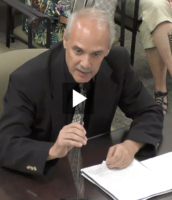 If the battle over public notice in state legislatures is framed as “newspapers vs the Internet,” newspapers lose.
If the battle over public notice in state legislatures is framed as “newspapers vs the Internet,” newspapers lose.
The Louisiana Press Association (LPA) has taken that lesson to heart as it prepares for a 2022 legislative session that it’s nervous about. In an attractive two-page flyer that will serve as a leave-behind for meetings with legislators (see flyer below), LPA is taking a new messaging approach by touting its members’ digital prowess in delivering public notice advertising across multiple channels.
Historical records vanish from the internet
 Earlier this year, we wrote about Harvard Law School professor Jonathan Zittrain’s “The Internet is Rotting,” an essay about how important historical records are disappearing from the web at an alarming rate. Zittrain indirectly made the case that it would be a mistake for policymakers to rely on the web as the sole publication point for statutory notice, since such notice is in part designed to serve as the official and unassailably accurate first draft of history.
Earlier this year, we wrote about Harvard Law School professor Jonathan Zittrain’s “The Internet is Rotting,” an essay about how important historical records are disappearing from the web at an alarming rate. Zittrain indirectly made the case that it would be a mistake for policymakers to rely on the web as the sole publication point for statutory notice, since such notice is in part designed to serve as the official and unassailably accurate first draft of history.
PNRC issues self-storage flyer
 In 2013, the Ohio Legislature passed a law giving self-storage facilities a choice of how to provide public notice of lien sales of the personal property of defaulting renters. Instead of requiring them to publish two ads about each sale in a local newspaper, the bill also gave them the option to advertise in “any other commercially reasonably manner.” The mode of advertising would be deemed reasonable if “at least three independent bidders attend the sale.”
In 2013, the Ohio Legislature passed a law giving self-storage facilities a choice of how to provide public notice of lien sales of the personal property of defaulting renters. Instead of requiring them to publish two ads about each sale in a local newspaper, the bill also gave them the option to advertise in “any other commercially reasonably manner.” The mode of advertising would be deemed reasonable if “at least three independent bidders attend the sale.”
This year, the self-storage industry is backing a new piece of legislation in Ohio. SB-79 would provide self-storage operators with even more flexibility. It would:
Bank notice big news in small town
 On a December day in 2019, Alyssa Meier (pictured at left) was at work at The Leader-News in Washburn, N.D. when she received an email from a local bank announcing its intention to publish a public notice, but its subject had to be kept confidential.
On a December day in 2019, Alyssa Meier (pictured at left) was at work at The Leader-News in Washburn, N.D. when she received an email from a local bank announcing its intention to publish a public notice, but its subject had to be kept confidential.
Meier had seen plenty of public notices in her newspaper career, but never a secret one.
“We have a pretty good relationship with the bank, and they sent me a kind of bizarre email about a confidential legal, so I set up a phone call with the bank president right away,” Meier said in a telephone interview.
Indiana courts consider website-only notice
 The Hoosier State Press Association (HSPA) thought it had a year to design the future of public notice. That turned out not to be the case.
The Hoosier State Press Association (HSPA) thought it had a year to design the future of public notice. That turned out not to be the case.
The latest encroachment on HSPA’s turf came from the Indiana Supreme Court, which recently proposed amending the state’s rules of trial procedure to allow court notices to be posted on something called the Indiana Court Legal Notice Website in lieu of newspaper publication. According to HSPA Executive Director Steve Key, the rule would encompass notices mandated in connection with foreclosure sales, estate administration, lawsuit summons and name changes. Key said his understanding is the website notices would be free of charge to the individuals required to publish them.
State press group asks for rate increase
 The South Dakota Newspaper Association (SDNA) recently testified in support of a rate increase for public notice advertisements published in its members’ newspapers. The Aug. 23 hearing had been called by the state’s Bureau of Administration (BOA) to consider its proposal to increase those rates by approximately 4.8 percent.
The South Dakota Newspaper Association (SDNA) recently testified in support of a rate increase for public notice advertisements published in its members’ newspapers. The Aug. 23 hearing had been called by the state’s Bureau of Administration (BOA) to consider its proposal to increase those rates by approximately 4.8 percent.
Under state law, BOA sets maximum rates for public notice advertising and is required to “annually review and adjust rates to reflect changes in economic conditions.” Nonetheless, it had been five years since the agency had done that before it initiated a formal review of fees in March. The review appeared to have been spurred by a written request the department received from SDNA a few days earlier.
Why public notice shouldn’t be published only on the web
 There’s no question that public notice ads should be displayed on the internet. That’s why 15 states have passed laws requiring newspapers that publish notices in their print edition to also run them on their website and/or on their state press association’s statewide public notice site.
There’s no question that public notice ads should be displayed on the internet. That’s why 15 states have passed laws requiring newspapers that publish notices in their print edition to also run them on their website and/or on their state press association’s statewide public notice site.
After all, notices are designed to be read and lots of people read stuff on the internet.
Wyoming municipalities opt out of state’s public notice laws
 There’s a nascent movement of counties asserting their right not to enforce laws they believe violate the U.S. Constitution. Although the Constitution explicitly states federal law is “the supreme law of the land,” public officials in these counties say they can ignore federal edicts that run counter to their interpretation of the founding document.
There’s a nascent movement of counties asserting their right not to enforce laws they believe violate the U.S. Constitution. Although the Constitution explicitly states federal law is “the supreme law of the land,” public officials in these counties say they can ignore federal edicts that run counter to their interpretation of the founding document.
That spirit of rebellion has reached into the realm of public notice laws this year in Wyoming, where two municipalities in Natrona County recently claimed the right not to run notices in their local newspapers despite state laws requiring them to do so.
‘Devastating’ public notice bill debated in Pennsylvania
 A hearing was held last week in Pennsylvania on House Bill 955, which would provide local governments in the state with the option to move their notices from paid-circulation newspapers to government websites or government-printed publications, newspaper websites, free-circulation newspapers, legal newspapers or shoppers.
A hearing was held last week in Pennsylvania on House Bill 955, which would provide local governments in the state with the option to move their notices from paid-circulation newspapers to government websites or government-printed publications, newspaper websites, free-circulation newspapers, legal newspapers or shoppers.
The hearing was notable for the breadth of issues it addressed and the emphasis the Pennsylvania NewsMedia Association placed on the economic impact the bill would have on local newspapers in the state if it passes.
The Constitutional Amendment Public Notice Snafu Blues
 Former Pennsylvania Secretary of State Kathy Boockvar (pictured at left) may be the first elected official ever to resign for failing to publish public notice advertisements. Boockvar stepped down in February after her office missed a publication deadline and delayed the potential passage of a constitutional amendment by at least two years.
Former Pennsylvania Secretary of State Kathy Boockvar (pictured at left) may be the first elected official ever to resign for failing to publish public notice advertisements. Boockvar stepped down in February after her office missed a publication deadline and delayed the potential passage of a constitutional amendment by at least two years.
“An amendment had been on track for a likely vote on the May 18 primary ballot until it was revealed that the Department of State had missed a key legal advertising deadline, scuttling the proposal, and resetting the clock,” reported the Pennsylvania Capital-Star.
